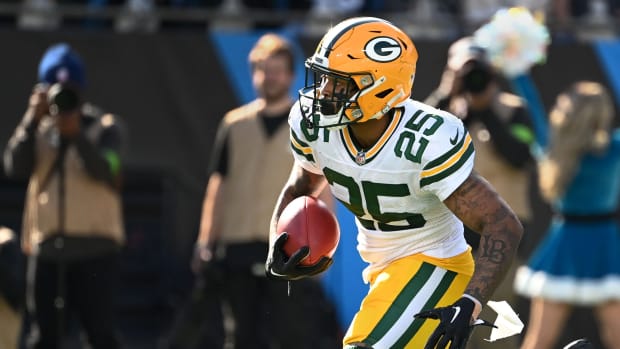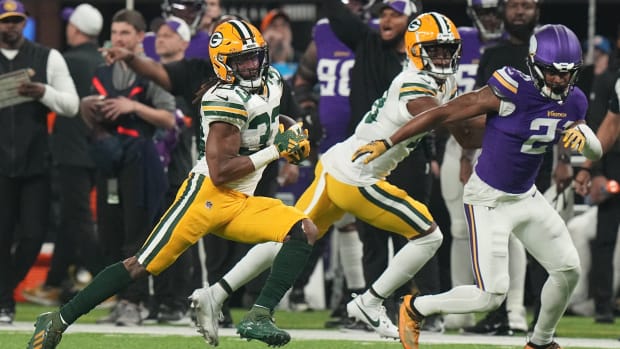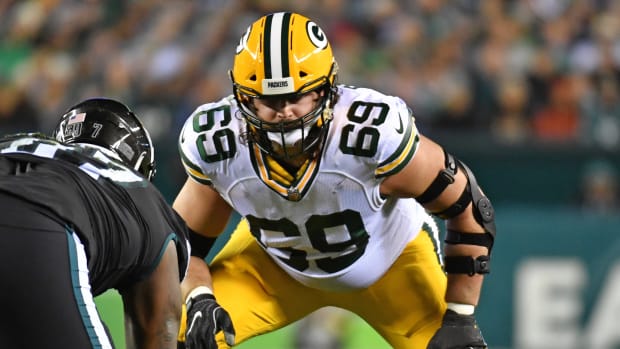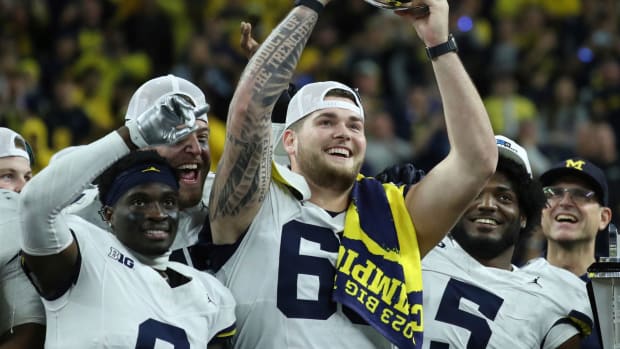Traded to Jets, Rodgers Leaves Packers With Complicated Legacy
GREEN BAY, Wis. – On Feb. 6, 2011, in Arlington, Texas, a 27-year-old hotshot quarterback named Aaron Rodgers led the Green Bay Packers to victory in Super Bowl XLV.
Back in Green Bay for the frigid welcome-home celebration, Rodgers told the 56,000 fans at Lambeau Field: “I’ll tell you what, Green Bay: We’re going to be right here next year doing this exact same thing.”
Books were written about that championship season. Books could be written about the series of playoff failures that followed.
A brilliant career ended on Monday with the Packers trading Aaron Rodgers to the New York Jets. The teams swapped first-round picks, with Green Bay moving from No. 15 to No. 13. Plus, Green Bay received:
- A second-round pick in 2023.
- A sixth-round pick in 2023.
- A second-round pick in 2024 that could move to a first-rounder if Rodgers plays 65 percent of the snaps in 2023.
If there was a way to lose a playoff game, the Packers found it over the past decade. It’s all part of a complicated legacy for Rodgers, who will not be returning to Green Bay for a 19th season and a 13th shot at a second Super Bowl ring.
A four-time MVP and in the NFL’s top-10 lists for career passing yards and touchdowns, Rodgers undoubtedly is one of the greatest quarterbacks in NFL history. With one Super Bowl ring, he’s no different than Nick Foles and Trent Dilfer.
What if Brandon Bostick hadn’t botched the onside kick in 2014? What if David Bakhtiari hadn’t suffered a torn ACL before the 2020 playoffs? What if the late Ted Thompson had been more active in free agency? What if his successor, Brian Gutekunst, hadn’t burned a first-round pick on Jordan Love rather than bolstering a roster that had just reached the NFC Championship Game?
From plays to players, so much of Rodgers’ one-championship legacy was out of his control.
In 2011, the Packers went 15-1 but the death of offensive coordinator Joe Philbin’s son blindsided the team before the divisional-round game against the Giants. A Hail Mary touchdown to Hakeem Nicks at the end of the first half put the Packers behind 20-10 at halftime.
In 2012, the defense gave up 323 rushing yards against the 49ers in the divisional round. It was as if defensive coordinator Dom Capers had never seen Colin Kaepernick run the read-option.
In 2013, the Packers, feeling a bit like a team of destiny with Rodgers back from a broken collarbone and in the playoffs following his game-winning touchdown pass to Randall Cobb at Chicago, blew a fourth-quarter lead and lost on a walk-off field goal in the wild-card round against the 49ers.
In 2014, there was the epic all-around meltdown that led to an overtime loss in the NFC Championship Game at Seattle. Any number of plays could have clinched that game; the Packers didn’t make any of them.
In 2015, the undermanned Packers took the Cardinals to overtime on 101 yards worth of Hail Marys to Jeff Janis, only to give up a 75-yard catch-and-run to Larry Fitzgerald on the opening play of the extra session.
In 2016, Rodgers delivered a superhuman stretch to “run the table,” but the Packers were practically out of players when they lined up for the NFC Championship Game at Atlanta.
In 2019, the defense gave up 285 rushing yards and six consecutive scores against the 49ers in the NFC Championship Game.
In 2020, Bakhtiari sustained a torn ACL at practice on New Year’s Eve. In the NFC Championship Game vs. Tampa Bay at an empty Lambeau Field, the Buccaneers collected five sacks against Green Bay’s offensive tackles. Tom Brady’s 39-yard touchdown bomb to Scotty Miller just before halftime and Aaron Jones’ fumble after halftime put the Packers in a 28-10 hole.
In 2021, the divisional-round game against the 49ers turned on Marcedes Lewis’ fumble, and the season predictably died on a colossal mistake by the special teams – a blocked punt that was returned for a touchdown.
In 2022, the win-and-in Week 18 game against Detroit turned on Jones’ fumble before halftime and the defense fell apart in the fourth quarter.
On the other hand, the quarterback failed to cement his legacy at times, too. When it was time to deliver an unforgettable moment, Rodgers’ play too often was forgettable.
In 2013, there was a first-and-goal failure in the final moments against the 49ers.
In 2014, five takeaways were turned into only six points.
In 2019, the offense failed to score a single point in six first-half possessions.
In 2020, they failed to capitalize on the last two of Brady’s three consecutive interceptions and stalled again on first-and-goal.
In 2021, Green Bay’s last nine possessions scored three points and the Rodgers-led passing game had minus-1 net passing yard in the fourth quarter.
In 2022, with a chance to get into the playoffs, the Packers scored only 16 points against one of the worst defenses in the NFL. Rodgers was 2-of-6 for 12 yards with one interception in the fourth quarter.
While Brady made it look easy, winning the Super Bowl is hard. From 2008 through 2022, 15 Super Bowl champions were crowned. Brady won four – three with New England and one with Tampa Bay. No other team had more than one until this year’s Super Bowl, when the Kansas City Chiefs (champions of 2019) beat the Philadelphia Eagles (champions of 2017) for a second title in four years.
Drew Brees won one with the Saints in 2009. It’s rarely talked about because Rodgers is such a polarizing figure, but Brees never got back to The Big Game, either. Peyton Manning was but a shell of himself when he finally won his second ring with the Broncos in 2015. Russell Wilson won one in 2013 and got back in 2014 but hasn’t even reached another conference title game. Philip Rivers, who ranks sixth all-time in yards and touchdowns, played in only one conference title game in his 15 seasons as a starter.
Going back a bit further, Dan Marino reached the Super Bowl in his second season, 1984, and never returned in 15 more tries. Brett Favre, of course, won a Super Bowl in 1996 and got the Packers back in 1997 but never again in his final 13 seasons.
“I think many times, and I’ve said this throughout my tenure here, the quarterback’s going to take the blunt of the blame when you don’t have success,” Packers coach Matt LaFleur said. “And a lot of the other times, when you do have success, they’re going to get too much of that praise. It takes everybody on that field.”
He’s right. The Packers lost playoff games in 2009, 2014 and 2015 in overtime with Rodgers never getting a chance with the ball. There were all-time failures on defense and stunning gaffes on special teams.
It’s also true that, later in his career, Rodgers melted in too many key moments.
In elimination games against the Buccaneers in 2020, 49ers in 2021 and Lions in 2022 – all at Lambeau Field, where the Packers used to be invincible because of weather and talent – Rodgers went 10-of-24 passing for 83 yards with zero touchdowns vs. one interception in the fourth quarters. Long the owner of the best passer rating in NFL history, his fourth-quarter ratings in those three games was 33.9. He led the team to two field goals in eight possessions.
Brady led six game-winning drives in Super Bowls alone. For Brady’s playoff career, he led 14 game-winning drives while losing eight one-score games. Rodgers led two game-winning drives in the playoffs while losing five one-score games.
Maybe the pressure of the moment was too much for Rodgers as the flame on his career candle flickered. That’s not to say Rodgers was a playoff choker. He was as clutch as clutch could be in the Super Bowl victory and the 2016 victory at Dallas. However, with the realization that every big playoff moment might be his last, maybe he was guilty of paralysis by overanalysis.
Whatever the reason, an era has ended. It was a career filled with the thrill of victories, highlights and MVPs. For the final dozen years, it also was a career filled with so many agonizing defeats that it’s almost impossible to celebrate the one Super Bowl triumph without pondering the Super Bowls that got away.





